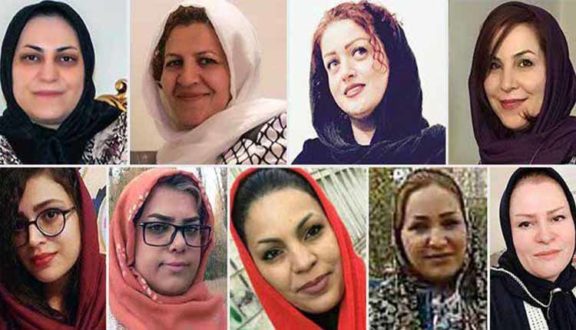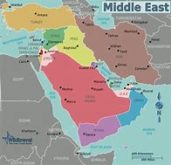Iran Human Rights – It has been over eight months since seven women belonging to the Gonabadi order of dervishes (Shokoufeh Yadollahi, Nazila Nouri, Elham Ahmadi, Shima Entesari, Sepideh Moradi, Avisha Jalaleddin and Sima Entesari) were detained in the notorious Qarchak Prison.
Alireza Roshan Reports:
Arrested during a massive attack by security forces and plainclothes agents on Gonabadi dervishes on Tehran’s 7th Golestan Street, a decision on their final conviction has yet to be issued. Despite legal breaches in the handling of their cases, including severe beatings during and after their arrest, the denial of a lawyer at all stages of the trial and their willingness to post bail, the judicial authorities have refused to accept a bail bond. Keeping these women in detention is unlawful, but holding them together with perpetrators of social crimes and in poor sanitary conditions even goes against the Executive Regulations for prisons and the Executive Regulations for centres of temporary detention.
Under the law, one of the main responsibilities of prison governors is to assure the full protection and care of prisoners. They are also charged with ensuring the proper treatment of the prisoners by other officials and agents under their authority (Section C (ج), Article 26 of the Executive Regulations for prisons). Nonetheless, there have been numerous problems and restrictions in violation of the laws and regulations which we will deal with in the following sections:
A) Inappropriate place of detention:
All of the above-mentioned dervish women have higher education. They include a specialist physician (Nazila Nouri), teacher (Shokoufeh Yadollahi), translator (Sima Entesari), PhD student in economics (Shima Entesari), musicologist and musician (Avisha Jalaleddin – a tanbur player who has performed with the famous Iranian Shahram Nazeri’s group). Allegations made simply on the grounds that these women are dervishes are ideological-political. Women inmates are classified in accordance with Article 65 of the Executive, which reads: “The prisoners must be allocated to a section of the prison or correctional facility based on their background, age, gender, type of crime, nationality, duration of sentence, physical and mental state, and the make-up of their character and capabilities”. The same is explicitly stated in the Executive Regulations concerning the mode of classification and allocation of prisoners. Nevertheless, the true reason for sending them to the infamous Qarchak Prison – which holds female convicts who have committed drug crimes, theft, murder and fraud – rather than to the women’s ward of Evin Prison is to inflict a form of physical and psychological torture.
B. Inadequate sanitary conditions in the prison:
Certainly, those responsible for the prisoners are more familiar than anyone else with the prison’s inadequate sanitary conditions. Unsuitable food, disease-bearing insects, darkness in the cells, the foul smell of sewage, inadequate light, the spread of contagious diseases among the convicts, etc., are only some of the dismal conditions women in this jail must suffer. This flies in the face of what Article 96 of the Executive Regulations says: “The conditions of prison facilities in general and the prisoner dormitories, in particular, should be in line with sanitary standards.”
C) Restriction on telephone calls:
One of the basic rights a citizen accused of a crime has is the right to telephone with their family and lawyer. Unfortunately, the dervish women have been deprived of the right to use the telephone under false pretexts right from the start of their confinement (from June 13th, 2018 to the present day). On the other hand, anyone convicted of intentional crimes, including murder, theft, drug smuggling, etc., enjoys the right to make phone calls. The note to Article 11 of the Executive Regulations for centres of temporary detention, issued in 2006, states: “Defendants may use their personal belongings, such as mobile phones and computers”. So, what reasons are there for prohibiting the dervish women from using the public prison phone? Certainly, denying the imprisoned dervish women the right to use the telephone to call their families has no legal or even human justification.
D) Failure to attend to medical needs:
The prison governor is responsible for ensuring the health and life of prisoners. Article 99 of the Executive Regulations stipulates: “In the case of emergencies, the ill patient shall be dispatched to the hospital upon the order of the physician or the prison clinic and with the permission of the prison governor or the prison governor’s deputy”. On arriving at Qarchak Prison, the dervish women had already sustained lots of injuries due to brutal beatings during their arrest by plainclothes agents, and it was at this point that the prison officials recorded the cuts, fractures, bruises and contusions. Some of them urgently needed treatment outside the facility, but unfortunately, they were either not transferred or were immediately incarcerated without any medical treatment. They were denied the human and legal right to medical treatment, one of the fundamental rights of any prisoner. The law clearly provides that the prison governor is responsible for the lives of these prisoners. Unfortunately, the clinic at Qarchak Prison failed to meet any of the legal requirements at the time. Some of the women prisoners need special food because of a medical condition. Prison authorities are required to provide this type of food in accordance with note 2 of Article 89 of the Executive Regulations, which states: “Prisoners who are ill shall be provided with the clinic’s special food in accordance with the plan and opinion of the attending physician for the period specified.” Notwithstanding the provision of the law, the female dervish prisoners have been denied this right.
E) Use of handcuffs and ankle chains during transfers to court and hospital:
Obviously, handcuffs and ankle chains need to be used when transferring dangerous criminals and convicted offenders who are at risk of escaping. Article 164 of the Executive Regulations for prisons reads: “It shall be allowed to use handcuffs on a prisoner at the prison governor’s orders or, in the prison governor’s absence, at the orders of the highest-ranking official in the prison as a means of control, to prevent self-harm, to preclude the harassment of others or prevent damage to property”. The note to this article states: “The use of legcuffs is permitted only if the prisoner cannot be controlled using handcuffs or other means.” Now, the question is what reasons other than psychological torture, humiliation and insult can there have been to attach handcuffs and ankle irons to the dervish women? Or where the law explicitly states: “Wearing special prisoner clothes is not obligatory for prisoners unless the prison governor deems it necessary” (Article 86 of the Executive Regulations for prisons). What justification is there for the harshness shown and the non-enforcement of the law for dervish women?
The above is a summary of the unlawful treatment of the prison officials and the judicial authorities to which the women prisoners were subjected. Such treatment not only breaches international human rights law but also violates the very letter of the Islamic Republic’s domestic laws.
 Shabtabnews In this dark night, I have lost my way – Arise from a corner, oh you the star of guidance.
Shabtabnews In this dark night, I have lost my way – Arise from a corner, oh you the star of guidance.



